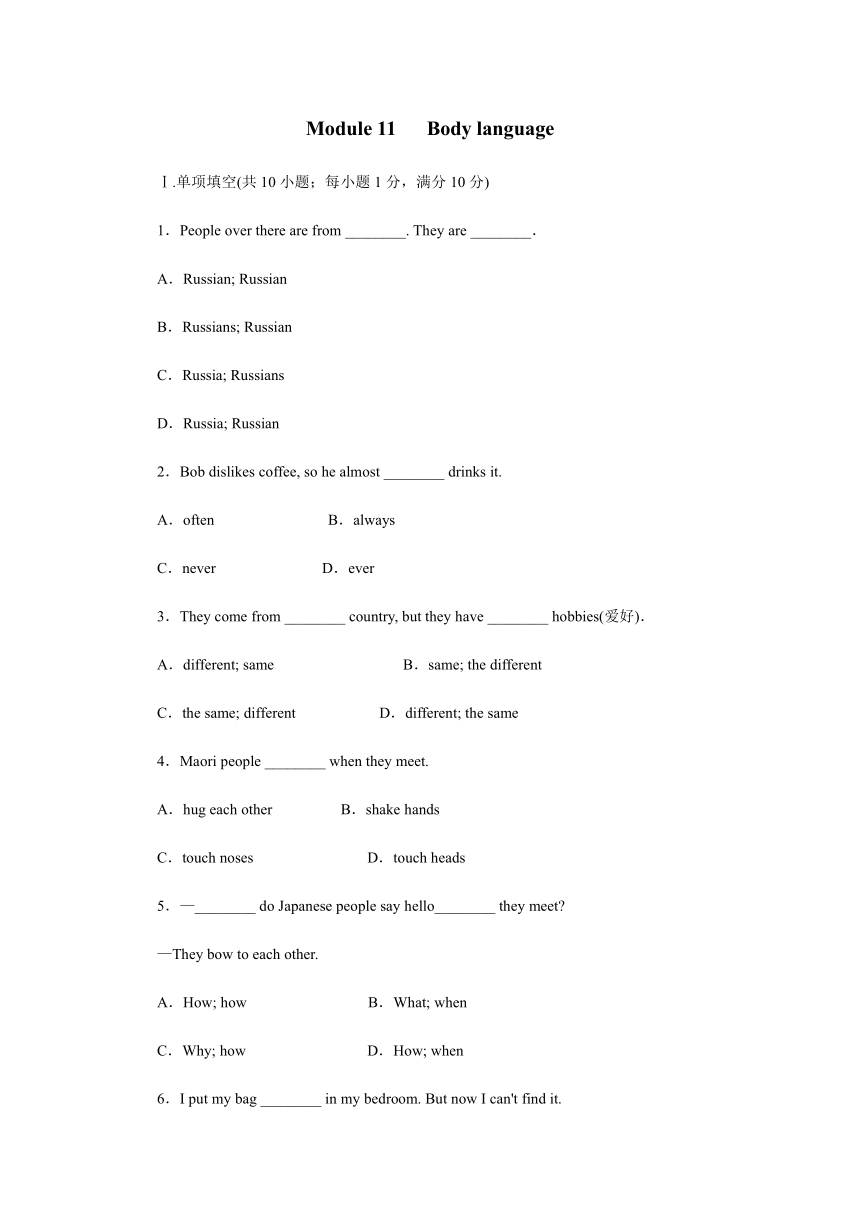
Module 11 Body language Ⅰ.单项填空(共10小题;每小题1分,满分10分) 1.People over there are from _____. They are _____. A.Russian; Russian B.Russians; Russian C.Russia; Russians D.Russia; Russian 2.Bob dislikes coffee, so he almost _____ drinks it. A.often B.always C.never D.ever 3.They come from _____ country, but they have _____ hobbies(爱好). A.different; same B.same; the different C.the same; different D.different; the same 4.Maori people _____ when they meet. A.hug each other B.shake hands C.touch noses D.touch heads 5.—_____ do Japanese people say hello_____ they meet? —They bow to each other. A.How; how B.What; when C.Why; how D.How; when 6.I put my bag _____ in my bedroom. But now I can't find it. A.somewhere B.anywhere C.everywhere D.nowhere 7.—Can I stand _____ people in the Middle East? —Yes, you don't have to stand _____. A.close to; far away B.close from; far from C.far from; close to D.far away; close from 8.I want to get Helen's telephone number. That's _____ I want to call her. A.because B.so C.why D.what 9.Don't _____ people when you _____ them in Britain. A.touch; talk B.touch; talk to C.touch; talk about D.touches; talk to 10.—_____ do they usually touch the face when they meet? —Twice, left and then right. A.How often B.How long C.How many times D.How far Ⅱ.完形填空(共10小题;每小题2分,满分20分) It is important for us to learn about different traditions in different countries. The __11__ to Western countries need to know these. Don't touch the __12__ things of the Western people. If this happens, say sorry politely. Some elder Western people think it's __13__ of you to help them without their agreement. They may feel unhappy. In Europe, it's all right to cross your legs when you are sitting. But don't cross your __14__in Thailand. It could bring you trouble. People in Thailand also believe the __15__ hand is not clean. So don't hold food or __16__ others with your left hand, or they may think you are __17__. In India, shaking your __18__ usually means “yes”, while(然而)__19__ your head means “no”. It's quite different from that in our country. So when you are in __20__ countries, remember to be polite. 11.A.writers B.visitors C.musicians D.doctors 12.A.personal B.real C.expensive D.noisy 13.A.polite B.easy C.rude D.friendly 14.A.mouth B.hands C.legs D.knees 15.A.right B.left C.first D.second 16.A.touch B.draw C.send D.receive 17.A.happy B.sad C.successful D.impolite 18.A.hand B.head C.foot D.nose 19.A.nodding B.shaking C.waving D.moving 20.A.big B.foreign C.beautiful D.rich Ⅲ.阅读理解(共5小题;每小题3分,满分15分) The meaning of shaking one's head is not always the same in different countries. Maybe some visitors would be surprised when they first come to India. Indians always shake their heads when they talk to others. But it does not have the same meaning as our “No”. If someone wants to visit India, he should know ... ...
~~ 您好,已阅读到文档的结尾了 ~~

